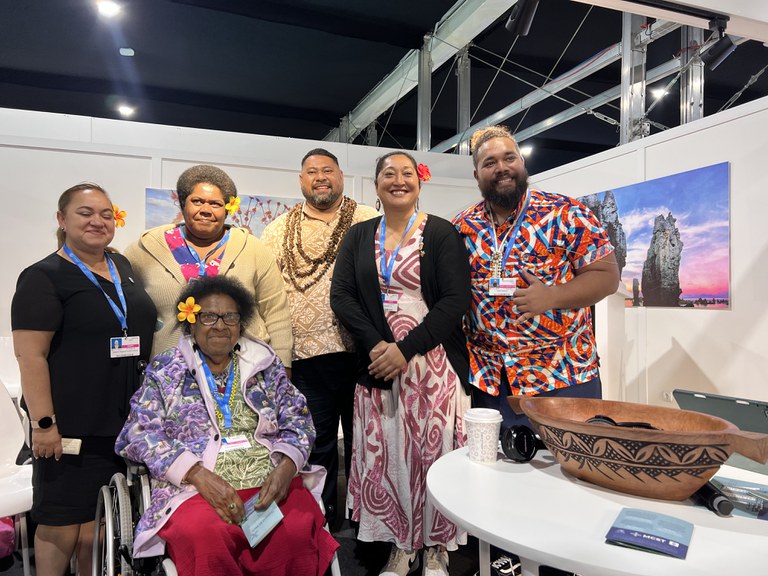Australia has been accused of being “out of touch with the reality of climate change” by campaigners as it bids to co-host the COP31 summit in 2026 with Pacific Island nations.
Talks at the UN’s COP29 in Azerbaijan have entered their second week, with Australia taking a leading role in climate finance negotiations, while also pushing to secure COP31.
A joint Australia-Pacific COP would be the first co-hosted by multiple nations and mark the summit’s return to the Southern Hemisphere after an absence of a decade.
Turkey is also vying to hold the event, with a decision anticipated possibly by the end of this week.
Pacific Islands Forum Secretary General Baron Waqa told BenarNews that Australia’s bid has the full support of Pacific Island nations and would be “great for the Pacific.”
“We just need to get to the finer details, to work out the finer details,” Waqa said in Baku.
Civil society groups say the divide between Australia and the Pacific’s climate ambitions must be addressed.
Australia’s government has been lobbying intensively to secure the hosting rights, including diplomatic overtures to competing bidder Turkey. Climate Change Minister Chris Bowen reportedly made a brief stopover in the capital Ankara on his way to COP29.
“Climate change is the biggest threat to the prosperity and security of the people across our Blue Pacific Continent,” Bowen’s office said in a statement to BenarNews.
“Australia and the Pacific share an ocean and a future; this is why we are bidding to host a COP in partnership with the Pacific in 2026.”
Torres Strait islander Togiab McRose Elu, representing an Australian community highly vulnerable to climate change, has also traveled to Azerbaijan to highlight the dire situation in her low-lying islands.
“I’m not happy with the Australian government,” Elu said.
“We’ve spoken to them about how climate change is affecting our islands and people, and they leave the room only to approve new gas projects.”
The islanders who live on Australia’s border with Papua New Guinea have for more than a decade been impacted by rising sea levels and flooding from king tides.
“Our people are refusing to leave their ancestral homes despite the rising sea levels,” Elu said. “They say, ‘Come what may, I will die here’.”
Civil society groups are urging Australia to align its domestic policies with the region’s priorities, particularly on no new coal or gas extraction projects, fossil fuel phase outs and limiting warming to 1.5-degree C.
President of grassroots advocacy group 350 Pacific, Joseph Sikulu, told BenarNews that Australia cannot have it both ways, accusing it of paying “lip service” to the region’s ambitions.
“Australia is the world’s largest emission exporter, with 35 coal mine proposals and six gas exploration projects in the pipeline but wants to be seen as an ambitious climate leader in the Asia-Pacific region,” Sikulu said.
“With Australia bidding for COP31 presidency, its actions – or lack thereof – here in Baku are under the spotlight, and unfortunately the country has demonstrated it remains completely out of touch with the reality of climate change,” he said.
“The extraction and expansion of coal and gas in Australia directly exports destruction to the Pacific.”
Countries hosting COPs are picked on a rotational basis from the five regional groupings of Africa, Asia, Eastern Europe, Latin America and Caribbean, and Western Europe and Other States.
In 2026 it will be Western Europe and Other States’ turn to host and Australia has secured the support of fellow group members U.S, UK, France, Germany, New Zealand and Canada. The decision is traditionally reached by consensus.
Pacific nations are part of the Asia group, which includes last year’s host Dubai. The last COP in the Southern Hemisphere was held in Peru in 2014.
A veteran Samoan climate negotiator and member of the COP29 Scientific Council, Sala George Carter, told BenarNews the opportunity of co-hosting with Australia would be “unprecedented for the Pacific.”
“As [COP] presidents, you have a key role in terms of the final language, the final area, that has been negotiated, “Carter said.
Fiji’s delegation to COP29 welcomes the prospect of a Pacific COP, and the increased visibility it will bring to the region’s “frontline” communities, but with qualifications.
“It will put enormous pressure on the Australian government to do something about their emissions strategy,” Fiji’s country lead in Baku, diplomat Sivendra Michael, told BenarNews.
Australian diplomat Emily Luck told a panel session at COP29 her country understood the value of a collective and co-ordinated voice.
“We in Australia certainly recognise our responsibility in addressing the climate crisis through our own transition to net zero and providing support for the Pacific,” Luck said.
“We certainly recognise our responsibility to reduce our emissions and advocate that other, including the world’s largest emitters, do the same.”
She highlighted that within this decade, Australia will be moving 82 percent of its electricity towards renewable energy, from just 32 percent in 2022.
350 Pacific’s Sikulu said if Australia wants to co-host COP31 “it must go beyond the fluff and take real action to transition away from fossil fuels (extraction).”
He said that also includes pushing other nations to realise the climate finance goal of U.S.$500 million for the Pacific Resilience Facility by 2026.
Australia is the largest donor so far, pledging US$100 million to the fund, with U.S, China, Turkey and Saudi Arabia collectively contributing the remaining US$16 million.














